Callum McLaughlin's Blog, page 6
August 23, 2021
Dolores Reyes & Dunya Mikhail | Mini Reviews
Eartheater by Dolores Reyes
Translated from the Spanish by Julia Sanches
Published by HarperVia, 2020
Rating: 



Eartheater is a strange and hypnotic look at violence and poverty in modern-day Argentina. Following the death of her mother, our narrator feels compelled to eat a fistful of freshly turned earth from atop her grave. This act grants her an exact vision of how her mother died. Word of her ability spreads through the community as she grows, with more and more people seeking her out with bottles full of earth, hoping she can give them answers about their missing and deceased loved ones.
Given the bold concept, it is perhaps unsurprising that there is a somewhat ethereal edge to the book’s atmosphere, but Reyes cleverly balances the stranger elements of the story with stark reminders of its present-day setting. This allows its social commentary to still resonate despite an air of whimsy.
I liked what the book seemed to be saying about our connection to the earth, and the marks we leave behind. Our narrator’s power also throws up some interesting moral questions: Should she accept money in exchange for her services, knowing how much her “clients” are suffering? Is it fair for others to expect her help when the process causes her considerable distress and discomfort?
In all, I thought this was a book of great ideas, carried by solid prose, but it never quite landed the sucker punch I was hoping for.
The War Works Hard by Dunya Mikhail
Translated from the Arabic by Elizabeth Winslow
Published by Carcanet Press, 2006
Rating: 




In this collection, exiled Iraqi poet Dunya Mikhail writes predominantly about the myriad ways her homeland and its people (particularly women and children) have been devastated by war. Though she uses some nice imagery, there’s a directness to many of the pieces that allows the sobering power of the subject matter to shine through. Experimentation is employed sparingly, and is all the more successful for it. And despite never shying away from reality, I appreciated the thread of hope that runs throughout.
August 20, 2021
Everywhere Antennas by Julie Delporte | Book Review
Everywhere Antennas by Julie Delporte
Translated from the French by Helge Dascher
Published by Drawn & Quarterly, 2014
Rating: 



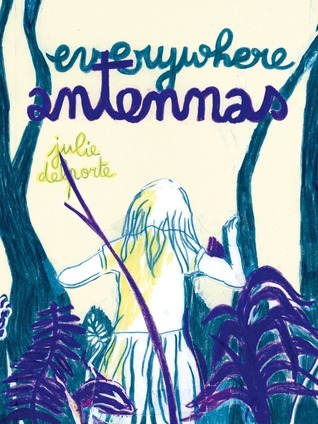
This unique graphic novel follows a young woman suffering from a rare hypersensitivity to electromagnetic radiation – generated by power lines, phones, the internet, and suchlike. Plagued by illness and frustrated by a lack of understanding and belief in her condition, she feels increasingly compelled to seek out ever-rarer “white zones” (remote areas undisturbed by radio waves). But in a society typified by a need for constant connectivity, this isolation will inevitably impact her relationships and career.
In terms of the prose and visuals, the book reads very much like a diary. The loose, fragmented style is sparse on detail and structure, with large jumps of time between certain entries, but it feels raw and unguarded in its expression. This informal, choppy, yet vibrant approach says a lot about our narrator’s mindset despite the book’s brevity.
Offering insight into a rare condition and an excellent depiction of the anxiety and fatigue that can come with modern life, this is at once a window into a specific viewpoint and a sweeping look at the consequences of irreversible urbanisation. It asks us to consider those who, for whatever reason, may be pushed aside in our quest for unchecked technological advancement, and at what cost we should prioritise our own health.
August 18, 2021
The Yogini by Sangeeta Bandyopadhyay | Book Review
The Yogini by Sangeeta Bandyopadhyay
Translated from the Bengali by Arunava Sinha
Published by Tilted Axis Press, 2019
Rating: 

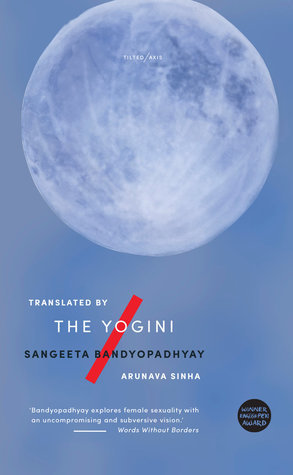
The more time I take to mull this one over, the more I come to realise it’s a novel I wanted to like more than I actually did. There are lots of great ingredients in the mix: a strong opening scene; a great initial concept; a flawed, interesting heroine; a focus on the idea of fate versus freewill; critique of the roles women are expected to fulfil; and solid prose. The trouble for me was the execution, which felt too contrived for me to ever feel drawn in.
In terms of plot, we follow Homi, whose seemingly stable life begins to fall apart when she becomes aware of a yogi; the figure of a man, visible only to her, who stalks her every move and claims to be a physical manifestation of her fate. This is a striking concept, and I was certainly intrigued enough to want to know how her story would culminate. Sadly, too many scenarios and exchanges of dialogue felt manufactured to conveniently steer the book forward. It was neither believable enough to feel real, nor strange enough to stand as outright magical realism or fantasy; landing instead in an odd sort of limbo that ultimately left me feeling underwhelmed.
I enjoyed enough of the elements at play to keep an eye out for more of the author’s work, and requiring just two sittings to get through, it was certainly a pacy read. That said, after such a strong setup, I can’t help but wonder how much more haunting the book could have been had I clicked with it stylistically.
August 16, 2021
Magma by Thóra Hjörleifsdóttir | Book Review
Magma by Thóra Hjörleifsdóttir
Translated from the Icelandic by Meg Matich
Published by Grove Atlantic, 2021
Rating: 




This strangely enthralling read documents one young woman’s experiences within a physically and emotionally abusive relationship. The stripped back style creates a sense of constant momentum, which in turn establishes a stifling, claustrophobic atmosphere that saw me immediately drawn in. In fact, I felt so invested in our heroine’s fate that I found myself racing through the book in a single sitting.
For a relatively slight novel, the author does a fantastic job of showcasing the realities of isolation and depression. With a deft hand, she shows the devastating impact of abuse, and just how easy it can be for perpetrators to coerce and manipulate those around them; forcing them into modifying their own behaviour and gaslighting them into self-blame.
My only gripe with the book comes with the ending, which is inherently tricky to discuss without resorting to spoilers. Suffice to say that, while I appreciated the outcome from a narrative perspective, the potentially clumsy message it conveyed worked less well for me.
Still, this slight blip didn’t detract from the overall success of the sucker punch that is this little novel. It’s brutally honest in its portrayal of a woman in decline, without ever feeling gratuitous, and it serves as a poignant reminder that even the most outwardly strong and carefree among us can be broken.
I sincerely hope more of Thóra Hjörleifsdóttir’s work is translated into English in the future!
Thank you to the publisher for a free advanced copy in exchange for an honest review.
August 14, 2021
Heaven by Mieko Kawakami | Book Review
Heaven by Mieko Kawakami
Translated from the Japanese by Sam Bett & David Boyd
Published by Picador, 2021
Rating: 


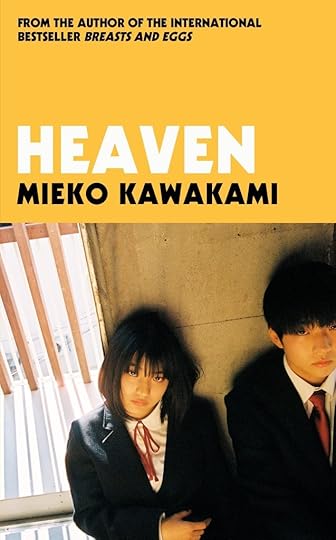
In her latest novel to be translated into English, Kawakami looks at the impact of flippant cruelty, and the cost of a connection forged in the shadow of violence. We follow a 14-year-old boy, ostracised from his class and the subject of constant bullying because of his lazy eye. As the level of torment escalates, he strikes up an unconventional though deeply meaningful friendship with Kojima, a girl from his class who suffers similar ridicule for being “dirty” and poor.
The prose itself is largely economical, but this works to reflect both the youth and the suppressed emotion of our protagonists. Despite some truly harrowing scenes, Kawakami skilfully maintains an air of gentle melancholy, as though the characters themselves are in a daze, resigned to their fate. This chimes nicely with the book’s discussion of the extent to which we are in control of our own lives, and the extent to which we are mere passengers.
On that front, the book’s core message seems to be one of resilience and autonomy; the idea that we should only ever seek to change on our own terms, and never to conform or appease others. Without dipping into spoilers, I would say this thread becomes a little muddied towards the end, and some additional closure for a particular character would have helped hit home Kawakami’s point with greater assurance.
The novel was first published in its original Japanese form back in 2009, and with regard to some clumsy presentation of gender and bodily difference, I would argue it shows its age. The dialogue, too, becomes convoluted at times, the reach for philosophical musings jarring with the otherwise sensitive portrayal of the book’s teen characters.
Still, I found this a very worthwhile look at loneliness and othering that confirms Kawakami is an author I’m intrigued to keep following. I don’t doubt several of its most quietly haunting moments will stick me.
August 12, 2021
Palimpsest by Lisa Wool-Rim Sjöblom | Book Review
Palimpsest by Lisa Wool-Rim Sjöblom
Translated from the Swedish by Hanna Strömberg & Richey Wyver
Published by Drawn and Quarterly, 2019
Rating: 




This graphic memoir follows the author’s journey to try and uncover her roots. Born in South Korea, she spent the first two years of her life in an orphanage before being flown to Sweden, where she was adopted and raised. Her attempts to explore her heritage as a teenager quickly met a brick wall, but upon the birth of her own children several years later, she feels compelled to reopen the search for her biological family.
Sjöblom does a fantastic job of reflecting the identity crisis that befalls many adoptees as they grow up, particularly people of colour who are adopted into white families. As a child, she is proud of her Korean ancestry and eager to explore the culture of her “first country”, but the reality of looking different from everyone else around her – including her own family – and the fierce racism this inspires soon take their toll. It’s heartbreaking to see the pride literally beaten out of her, and Sjöblom doesn’t shy away from the realities of rock bottom, with discussion of attempted suicide and hospitalisation.
She goes on to explain the power that lies in connecting to a people and their culture, and that the need to uncover the past is not necessarily about being unhappy within your adopted family, but about establishing roots that tether you to the world and make you feel seen. As she explains: “In Sweden I’m at home, but I feel like a stranger. In Korea, I’m a stranger, but I feel at home.” Her search is as much about finding closure for herself as it is sparing her children a similar longing for answers in the future.
As for the format, it makes a lot of sense given Sjöblom’s background as an illustrator and graphic designer. While I like the muted colour palette, the visuals themselves are quite simplistic in style and don’t do much to advance the narrative. Indeed, the book is very text heavy for a typical graphic novel or memoir, with several full-page transcripts of emails and letters that were exchanged during the author’s enquiries. On occasion, this can make it feel a little like reading a case file, with some of Sjöblom’s personal flair lost.
That said, I greatly admire her determination to speak frankly about the corruption her investigation unearths. Falsified information, withheld details, illegal practices, and outright lies hinder her personal search, but they also speak of the wider issues faced by many Koreans who were (often wrongfully) sent overseas for adoption. I also appreciate that Sjöblom makes clear not every search culminates in a neat and much longed for happily ever after: Not knowing is painful, but sometimes the truth is too.
In all, this is an excellent memoir that opened my eyes to an issue many of us should be more aware of. The author explains that most “adoption stories” are framed in a positive light, told from the perspective of a loving adoptive parent, and rarely from an actual adoptee who has experienced the process’ highs and lows in equal measure. It is her hope that this book may be a voice for a generation of Korean adoptees who have been silenced; I urge everyone to listen.
August 9, 2021
The Others by Sarah Blau | Book Review
The Others by Sarah Blau
Translated from the Hebrew by Daniella Zamir
Published by Pushkin Press, 2021
Rating: 




The Others blends the intrigue of a thriller with pertinent social commentary. The book opens with the news that one of Israel’s most prominent feminist scholars has been murdered. Even more distressing, her body was displayed in a horrifying tableau clearly designed to send a message: tied to a chair, a baby doll glued to her hands, the word mother scrawled across her forehead. Sheila, a former college friend of the victim, understands right away: someone takes serious issue with their long-ago pact to remain childless. But that means she and her other old friends could be next in line – or the ones responsible.
Blau does a great job of crafting an anti-heroine. From the off, it’s clear that Sheila is not only holding back information, she is also a highly flawed person, capable of intense jealousy, vanity, and even cruelty. This serves to make her narration somewhat unreliable, forcing the reader to remain on their toes as to where the guilt truly lies.
Employing such unlikable characters is also a clever way of highlighting the complex nature of feminism. The central group’s desire to defy the rigidity of ascribed gender roles – to gain autonomy over their own lives and bodies despite pressure and derision – is an admirable cause that is easy to get behind. But this ferocity of spirit does not make them exempt from treating each other to the kind of catty, underhand behaviour that feels indicative of everything feminism should stand against. In short, we contain multitudes, and women are each other’s worst enemies as often as they are their greatest allies in their fight for equality.
The novel is chiefly concerned with women seeking the freedom to make – and change – their own minds, the pressure to become a mother, and the fine line between friendship, love, and hate. The setting of contemporary Israel allows the author to weave in commentary on the likes of religion, politics, and gender, but that’s not to say the story ever feels dry. On the contrary, the book moves along at a canter, well-placed reveals keeping you hooked and making this a compelling read despite – and because of – the big themes it tackles.
That said, things can get a little heavy-handed at times. On occasion, the book also deliberately leans into genre tropes, but rather than tackle them from an unexpected or original angle, a character simply declares, “This is like something out of a bad crime book!” – a device I find a little grating. But that was never enough to hinder my enjoyment of the time I spent with this genuine page-turner. It’s rare you find a book that would just as likely spark debate in a serious gender studies class as it would a casual book club, but this just might.
August 7, 2021
Let’s Recommend | Books by Women in Translation
August is Women in Translation Month – a perfect opportunity to read, recommend, and celebrate books by women from around the world. I’ve compiled a list of recommendations the past couple of years to mark the occasion, which you can find here and here, but I wanted to share a few more I’ve read and loved since then. So, without further ado, here are some great books by women in translation!
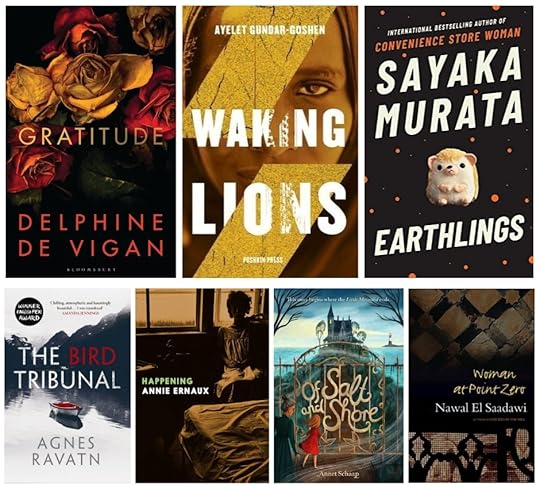
Gratitude by Delphine de Vigan | France | translated from the French by George Miller
An elderly woman suffering from aphasia seeks to recover control of her speech before she loses the chance to say what must be said. The novel looks at the importance of language and communication; to express our emotions, to expunge ourselves of guilt, and to tether us to the world. Understated yet poignant, de Vigan does a fantastic job of crafting a convincing voice for her elderly protagonist, reflecting the pathos, frustration, and unexpected humour of growing old.
Waking Lions by Ayelet Gundar-Goshen | Israel | translated from the Hebrew by Sondra Silverston
When a woman witnesses a hit-and-run, she blackmails the doctor responsible in order to help her community. This layered novel looks at guilt, loyalty, and culpability. Filled with morally complex characters, it offers incisive commentary on pertinent social issues such as racial prejudice, immigration, access to healthcare, and corruption. Intelligent and compelling, it confirms Gundar-Goshen’s place among my favourite writers of literary thrillers.
Earthlings by Sakaya Murata | Japan | translated from the Japanese by Ginny Tapley Takemori
This unsettling novel is concerned with those who fail to adhere to society’s norms, and the notion of storytelling as a means of self-protection. The climax offers a descent into madness not for the faint of heart, but the book as a whole is gripping, provocative, and highly memorable.
The Bird Tribunal by Agnes Ravatn | Norway | translated from the Norwegian by Rosie Hedger
Set on an isolated fjord, this is a slow burn psychological cat-and-mouse game between two self-exiled loners; each determined to expose the other’s true nature while guarding secrets of their own. Ravatn is able to build tension with pin-sharp precision, imbuing even the most mundane interactions with a looming sense of threat, culminating in a smart genre piece that gets under your skin.
Happening by Annie Ernaux | France | translated from the French by Tanya Leslie
This is an entirely unsentimental reflection on Ernaux’s experience of illegal backstreet abortion in 1960s France. For such a brief and focussed account, it manages to detail the lasting physical and emotional toll she endured, while pulling back to comment on the ongoing importance of victim testimonies, and access to safe healthcare.
Of Salt and Shore by Annet Schaap | Netherlands | translated from the Dutch by Laura Watkinson
This is an imagined sequel to the classic tale, The Little Mermaid. It feels fresh and original but calls on fairy tale archetypes to pay suitable homage to the stories that inspired it. It’s a fun, enchanting read, but it’s not afraid to embrace the sinister undertones inherent to said old-school fairy tales. Better yet, it incorporates the worthwhile themes of abuse, othering, found family, and self-acceptance.
Woman at Point Zero by Nawal El Saadawi | Egypt | translated from the Arabic by Sherif Hetata
An imprisoned woman awaiting execution relays her life story in this damning indictment of systemic sexism. For all the suffering our heroine endures, her fierce spirit consistently shines through, with Saadawi exploring the notions of abuse and blame in powerful ways that continue to resonate with readers – long after the book was first published.
I’ll leave it there for now! What are some of your favourite books by women in translation?
August 5, 2021
So Long a Letter by Mariama Bâ | Book Review
So Long a Letter by Mariama Bâ
Translated from the French by Modupé Bodé-Thomas
Published by Virago, 1980
Rating: 



This semi-autobiographical novel captures Senegal at a time of great cultural change, with a particular focus on women’s increased resistance in the face of strict gender roles. Recently widowed Ramatoulaye is observing a formal period of mourning for her husband, as dictated by her Islamic faith. She uses this time of isolation to write to her longstanding friend, reflecting on the highs and lows of her life.
Ramatoulaye’s husband secretly married a much younger woman (a close friend of their daughter, no less) 30 years into their relationship. The sense of betrayal and embarrassment deeply wounded Ramatoulaye, and I enjoyed the glimpse this setup provided into the controversial issues of polygamous marriage and female autonomy. Though this is the focus of the book’s first half, there were several tangents that I felt hampered the pacing overall. Many of these included Ramatoulaye’s detailed retelling of events involving the friend to whom she was writing. In this instance, the narrative framing felt odd and laboured, as there was no discernible need for her to recount so clearly information already known to the recipient.
For me, the second half was much stronger, when the focus shifted to the dynamic between Ramatoulaye and her daughters. In this section, Bâ is able to reflect the difficulties experienced by her heroine’s generation; when their own strict, religious upbringing clashed with the liberation and Western influences embraced by their children. There is subtle though very effective commentary on the struggles of reconciling feminist ideals with a protective mothering instinct: wanting your children to have the freedoms you lacked, while remaining all too aware of society’s prying eyes.
Elegant prose rich with poetic metaphor, astute observation, and enduring themes – there really is much to admire here, even if the execution didn’t always work for me. While not always the most “enjoyable” read in that respect, the time I spent with this was certainly worthwhile, especially when placed within the context of its original publication some 40 years ago.
August 3, 2021
The Dangers of Smoking in Bed by Mariana Enriquez | Book Review
The Dangers of Smoking in Bed by Mariana Enriquez
Translated from the Spanish by Megan McDowell
Published by Granta Books, 2021
Rating: 


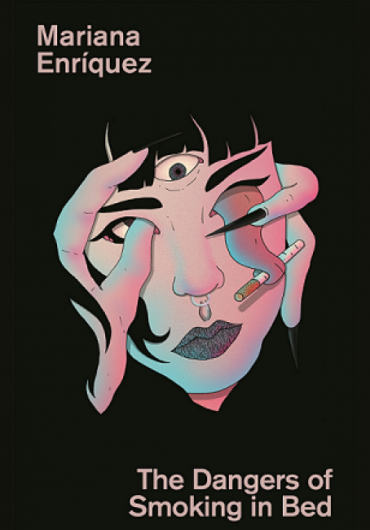
Taking the stories as individual pieces, this collection was a bit hit-and-miss for me, but Enriquez’s overall style and approach were so striking that I’m very glad to have picked it up.
Things start off a little tamer than I anticipated, but as we progress, the collection leans further into its dark, unnerving core – and it’s all the better for it. Strong concepts and haunting imagery ensure the best stories will linger with me for quite some time. Enriquez does an excellent job of subtly ramping up the tension and leaving you with a sense of dread – even in the stories where little actually happens.
The stand out stories for me came in the middle of the collection: Meat, about the devoted fans of a recently deceased popstar, and Where Are You, Dear Heart?, about a woman’s increasingly extreme efforts to satisfy her unusual fetish. Both explore the dangers of obsession and unfettered desire.
Executed to various degrees of success, other memorable setups include a woman haunted by the infantile ghost of an ancestor; a group of teens who use a Ouija board to try and contact the dead; and a city plagued by the sudden reappearance of all its missing children, all of whom remain physically unchanged though undeniably different.
The less effective stories have a tendency to fizzle out after an intriguing start, destined to be quickly forgotten. Still, the collection as a whole is well worth checking out for anyone who likes their horror subtle yet disturbing. This particular offering is elevated by bold tableaus, and is carried throughout by strong prose that has been seamlessly translated from the original Spanish.



